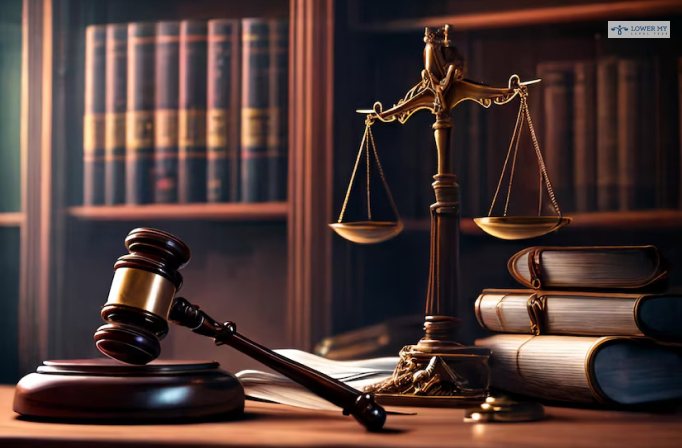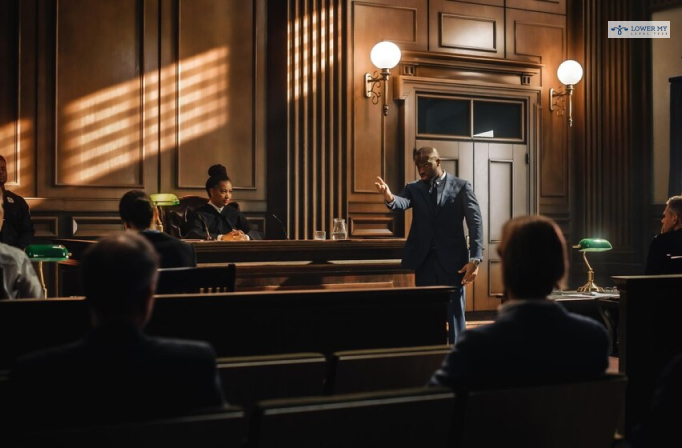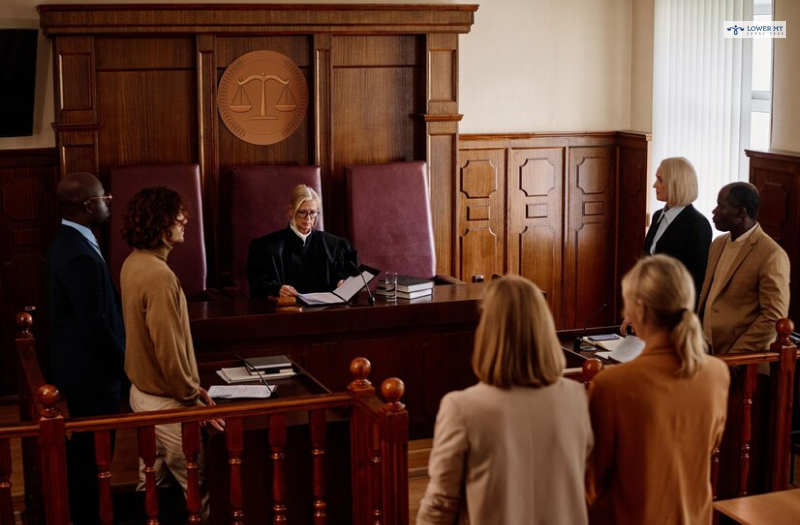Suborning perjury is the fancy name given to inducing someone to lie under oath within a criminal proceeding. Moreover, an individual shall be guilty of suborning perjury if they attempt to induce a witness under oath in a court or within any other proceeding, especially when the witness is obliged to do so and lied under oath. This article will discuss the crime of suborning perjury and the defenses associated with the offense.
What Is Suborning Perjury?

The crime of suborning perjury is committed by an individual when they lie under oath. This means they intentionally lie even after swearing to tell the truth before the court. Moreover, if the witness decides on their own that they shall lie under oath and do so without informing the criminal defense attorney, only then they shall be guilty of false witness.
Criminal law in the US prohibits and punishes commitment of perjury. This is because the legal system depends on truthful testimony to serve the interest of justice. A witness who swears to tell the truth but lies leads to impairing the foundation of the legal system.
An individual is said to be guilty of suborning perjury when they attempt to induce a witness to provide false testimony under oath in a court or any other proceeding, along with the witness complying with the same and eventually lying under oath.
Conditions Required To Prove Suborning Perjury

The prosecution or the criminal defense lawyer will be required to prove that the witness of either party is committing the offense of false testimony or suborning perjury. Here are some factors that must be proved for charging an individual guilty of suborning perjury.
The Defendant Attempted To Persuade The Witness
The individual charged with suborning perjury will be guilty only when the individual has tried to convince a witness to lie under oath. The term “suborn” means to cause or bring about. Moreover, the individual attempting to induce a witness to provide false testimony does not necessarily need to threaten the witness.
For instance, in the congressional hearing scene in The Godfather Part II, Micheal Corleone and his attorneys surprised a witness during his testimony by presenting the witness’s Sicilian brother in the hearing room. No threat was made, but the witness did change their testimony.
The Defendant Believed That The Testimony Is Or Will Be False
The individual who shall try to sway a witness must believe that the testimony they are trying to induce is false. Moreover, pushing someone to tell the truth is not considered suborning perjury. This applies even if the effort aggressively persuades the witness to tell the truth. However, if a threat is involved, it shall become a different offense altogether.
The Witness Did Lie Under Oath
Suborning perjury usually occurs only when the witness has lied under oath. So, an individual whose efforts to convince a witness to lie is unsuccessful is not guilty of committing the offense as there has been no commitment of perjury.
However, if the witness compromises and comes down to testify but does not, the one who prayed him to lie shall not be considered guilty of suborning perjury. Besides, the witness must bear witness to the court or any prosecution or proceeding to prove the subornation perjury, especially to the witness who has sworn the truth in the oath under the authorized personnel. Therefore, an organization with its employees lying about the tactical part of the safety process when conversing with the media is not wrongly charged for suborning perjury.
Rules for Attorneys to Prove Suborning Perjury

Generally, mere knowledge that someone else is planning on committing perjury, while trying it to make it happen, does not amount to suborning perjury. However, this rule changes when a lawyer knows their client or any witness the attorney plans to call will lie under oath.
Attorneys have a special duty as officers of the court. They are not only barred from trying to influence a witness to lie under oath. But is also required to call upon the witness who they believe shall lie under oath. So, the attorney is responsible for informing the witness of the consequences of committing perjury and advising them to do that.
Witnesses Who Are Not The Attorney’s Client
In both civil and criminal trials, if the witness who intends to give false testimony is not the lawyer’s client, the attorney is duty-bound to not call upon that witness. So, no matter how much the lawyer’s client wants that individual to testify, the lawyer must say no.
Witnesses Who Are Criminal Defendants
What happens when the witness is the defendant himself in a criminal proceeding? In a criminal trial, defendants have the absolute right to testify, even over the lawyer’s objections. Because an attorney cannot stop a client from getting on stand and lying, while many attorneys will make the move to withdraw the case.
However, judges will have to know why the lawyer is making such a request, and this is where the lawyer faces a dilemma. Divining their client’s plans might lead to the violation of attorney-client privilege. However, if the lawyer refuses to give reasons for their withdrawal request, the court might not grant it.
In such circumstances, the lawyer shall be required to call the client to the stand, knowing that they will lie. If this occurs, the lawyers must allow the client to testify narratively and not ask questions. Or otherwise, guide or direct the testimony; this is the ABA’s “model rule.” This way, the attorneys will prevent themselves from participating in perjured testimony.
Witnesses Who Are Civil Plaintiffs Or Defendants
Lawyers for civil plaintiffs or defendants who share their plan to lie on the stand do not face the same predicament as their criminal counterparts. Moreover, civil defendants and plaintiffs do not have the constitutional right to testify, so their lawyers might and should refuse to call them.
Learning About Perjury After The Fact
The special rule for attorneys comes into play not only when the attorney learns the plans for false testimony. But when the attorney learns the witness has already done so.
For instance, suppose a lawyer in a harassment case calls a witness to the stand who testifies that they have never socialized with the alleged harasser.
After the witness has finished testifying, the lawyer’s clerk shall find the witness’s Facebook page, which shows the witness’s picture and the alleged harasser at a tailgate party, toasting each other.
So, the lawyer must disclose the discovered perjury to the court and the attorney for the other side.
Defenses to Suborning Perjury

Some of the most common defenses to suborning perjury are mentioned below.
Truth Is The Defense
As with an allegation of perjury, the fact that a witness told the truth has defeated the charge of suborning perjury.
No Suborning Perjury If Perjury Did Not Occur
Even a vigorous effort has been made to get the witness to lie, which is not suborning perjury. This is especially true when the witness has never lied while being on the stand.
Belief That The Testimony To Be Given Is True Is Also A Defense
Additionally, the defense of truth, where the person has been charged with subornation, can show that they genuinely and reasonably believed the witness’s testimony was accurate. So, the charge of suborning perjury will not apply in such cases.
Recantation By The Lying Witness Is Not Defense To Suborning Perjury
Witnesses might avoid perjury punishment if they recant their previous false testimony during the same proceeding. However, the offense of suborning perjury is a separate crime, and the witness’s recantation is not a defense against that offense.
Moreover, a witness’s recantation will most likely be used against the individual charged with subornation because it’s the admission of perjury.
How Is Suborning Perjury Punished Under Criminal Law?

The federal legislation for the suborning perjurious offences is dictated that an imprisonment term may be no longer than five years and be subject to a fine. The subornment of perjury charges will amount to a felony requiring at least one year in state prison.
Also, perjury charges against the one who suborns perjury in a criminal trial may be associated with accessories to the underlying crime charge, even if the perjury charges under the same circumstances include nothing on the defendant’s part in the crime.
On the other hand, the suborner may find themself facing not only subornation but also an accomplice to the crime they are being charged in the proceedings.
Final Thoughts
Upholding perjured witnesses is a felony, but it goes through many stages. You should hurry if you are being accused of this crime, and you should talk to a knowledgeable criminal defense lawyer first. Such crimes are state-wide; therefore, you need an experienced defense attorney who will use their experience to deal with any laws that apply in the state and determine whether the case is strong enough and what available defenses are.
Read More,
What Are The Two Types Of Criminal Law In America?
What Is The Criminal Justice Process?: A Comprehensive Guide
Criminal Sexual Conduct 4th Degree: What Are Its Penalties?






